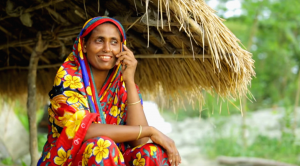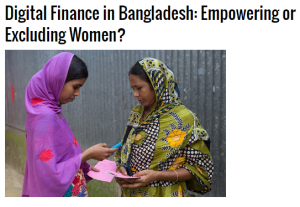Noorbanu was thrilled to use the mobile phone for the first time. She was newly married and her husband lived far away from the family for his job. He got her a mobile phone through which she could stay in touch.
bKash made it easier for her husband to send money back home. Noorbanu used to collect the money from a neighbour. But she would receive it mostly at the convenience of the neighbor, mostly 4-5 days late. She heard excuses of theft as well.
Noorbanu was a BRAC client for the Microfinance programme and was eventually brought under the BRAC led training on using mobile money for remote transactions. Commuting is a struggle in Hatia, the village she lives in, and commuting for financial purposes being a woman is a big ‘No’ for the family.
Like most she was reluctant about using bKash herself. Learning the numbers, then learning the numbers in English and remembering the whole steps all through- she did not think it was a worthy effort. But she did give it a chance. Now Noorbanu can receive the money immediately from her husband with no time delays, she pays her installments from home, she recharges her phone, all using mobile money. She even discovered that she can pay her son’s Madrasah fees though bKash.
From digitalising microfinance transactions, disbursing sanitation loans and interest schemes for Rana Plaza Victims, to encouraging youth to save through mobile money, BRAC has been a thought leader in internalising mobile money usage as a trigger to foster greater organisational and programmatic success within and beyond.
With the rapid growth and expansion of BRAC Bank led bKash in the country, the quick absorption of mobile money indicates an enormous future for financial inclusion in the country. For financial inclusion to generate sustainable impact, both vertical and horizontal outreach in terms of demand projection, product design and service delivery is crucial. Mobile Money facilitates financial inclusion both vertically and horizontally; the former by ensuring existing clients of the formal banking system are served more conveniently, and the latter by allowing the unbanked population to be included in the system through extended services.
Traditional banking, even in highly tech based ecosystems imposes enormous monetary cost. The European Payments Council reckons that the European Union’s 360 billion cash transactions cost at least €50 billion ($65 billion) a year. Visa, a huge credit-card alliance, reckons cash accounts for most of the $1.3 trillion spent a year across the world on small-ticket items.
A recent research by GSMA Intelligence finds Bangladesh to have remarkably high mobile penetration even in the rural areas, however, consumer spending level to be among the lowest in the world. It also projects a lower level of reliance on growth from new subscribers and asserts the need for mobile operators to generate new revenue streams around people’s needs. Mobile financing hence has been popular among both public and private institutions, including Bangladesh Bank and 16 Banks in the ecosystem of MFS in Bangladesh, marked by the launch of Regulatory Guidelines in 2011.
M-PESA, the mobile wallet service offered by Safaricom in Kenya attracted 1 million registered users in 10 months, in a country where fewer than 4 million people have bank accounts. And in the Philippines, the country’s two mobile network operators offer the functional equivalent of small-scale transaction banking to an estimated 5.5 million customers. It shows that case studies and lessons learnt exist in ecosystems which have been global leaders in the present decade that can be utilised for Bangladesh.
With mobile phones getting more ingrained in our lifestyle, businesses streamlining their financial product designs and services, new rising opportunities for partnership and collaboration on the horizon, the way forward for Bangladesh will be defined by how well we are able to mitigate the risks and challenges with enhanced regulatory measures, technological innovation and shared learning.

